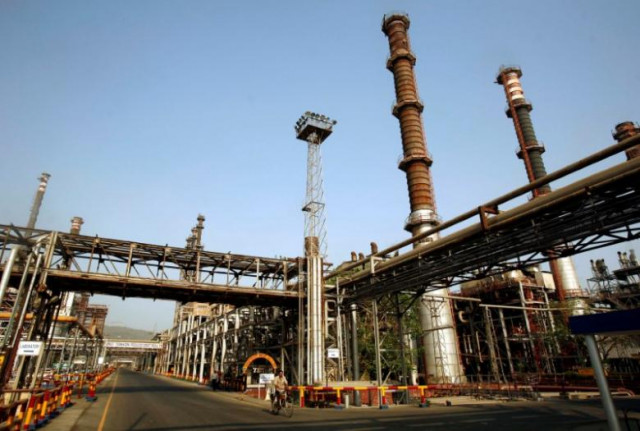CCI likely to approve amendments to Petroleum Policy 2012 today
May allow creation of provincial directors’ posts at DGPC to have say in policies

A worker rides a bicycle at a Petroleum Corporation. PHOTO: REUTERS
The Council of Common Interests (CCI) - an inter-provincial body that has representation from all provinces - is scheduled to meet on Friday to discuss proposed changes to the petroleum policy. The CCI is expected to approve the creation of additional posts of four provincial directors and the chief financial officer at the Directorate General of Petroleum Concessions (DGPC) in order to give proper representation to the provinces in framing petroleum policies.
K-P to demand right to award oil blocks in CCI meeting
As part of amendments proposed in the Petroleum Policy 2012, the CCI may give exploration companies the option of switching to the new policy in the case of licences, and development and production leases only. It may impose a windfall levy on oil production covered by the Petroleum Concession Agreements (PCAs) executed under the old petroleum policies of 1994 and 1997.
The CCI is also expected to offer incentives for increasing gas production from the existing fields. In the new Petroleum Policy 2012, the government has encouraged oil and gas production companies with a price incentive to produce 10% more gas from the existing fields.
Sources told The Express Tribune that a committee formed to address the hurdles in the way of implementing the Petroleum Policy 2012, in its meeting held in December 2015, had allowed Mari Petroleum to shift to the 2012 policy for availing itself of the incentives under Section VI of the policy.
The committee, constituted by the federal government, comprised deputy chairman of the Planning Commission, finance secretary and secretaries of energy ministries of the four provinces.
Later, the committee in its meeting on January 19, 2017 approved the price incentive in the 2012 policy for the volumes produced above the benchmark of 525 million cubic feet per day (mmcfd) for the Habib Rahi limestone reservoir, but lower than the target of 577.5 mmcfd.
Earlier, Mari Petroleum had been working under the “cost-plus return on equity” formula, but the government scrapped it later in an attempt to increase the wellhead gas price from $0.37 per million British thermal units (mmbtu) to $2.17 over the next five years. The CCI may ratify the offer of higher gas price to Mari Petroleum. In Mari Petroleum, the government has a 20% stake, Oil and Gas Development Company has 20% shareholding, Fauji Foundation holds 40% shares and the general public has 20% shares.
The federal government has signed 72 supplemental agreements with oil and gas production companies following the permission for policy shift under the Petroleum Policy 2012.
Fuel could get expensive as FBR seeks greater sales tax
The Law Division is of the opinion that the government should present these agreements to the CCI for formal approval.
According to a deal with other exploration companies, the government has offered a price of $4.1 per mmbtu for blocks awarded under the 2007 petroleum policy, $4.38 for blocks covered by the 2009 policy and $5.78 for contracts reached under the 2012 policy if crude oil price is $100 per barrel. These prices are for the exploration blocks that have been shifted from the old to new petroleum policies.
In order to process applications in a transparent manner, a model supplemental agreement has been designed in consultation with the finance and law divisions. Consumer gas prices will rise following the increase in wellhead prices for exploration companies that shift to the 2012 policy.
“There are two ways of absorbing the price increase. First, provinces could take a hit on their gas development surcharge (GDS) collection and second, consumers could be forced to pay higher consumption bills,” a government official said.
Published in The Express Tribune, August 25th, 2017.
Like Business on Facebook, follow @TribuneBiz on Twitter to stay informed and join in the conversation.



















COMMENTS
Comments are moderated and generally will be posted if they are on-topic and not abusive.
For more information, please see our Comments FAQ